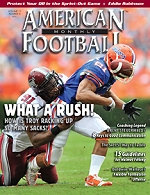Article CategoriesAFM Magazine
|
From The Coaches Bookshelf – Eddie Robinson The Martin Luther King of Footballby: Denny Dressman© More from this issue Covering six decades, Eddie Robinson’s coaching career paralleled the Jim Crow era of segregation in the Deep South and every major event of the Civil Rights Movement. His tenure spanned 11 U.S. Presidencies and four wars involving American troops – 57 years at the same university: Grambling. His football teams won 408 games and nine black national championships. Robinson opened the NFL to players from historically black colleges and sent more than 200 players into pro football. In Eddie Robinson, Denny Dressman documents a man who was called, ‘the Martin Luther King of football.’ Life ended for Eddie Robinson on April 3, 2007. By then, early in his eighty-ninth year, his legacy as a record-setting football coach had long been confirmed. Yet the fullness of his contribution as a historic black American role model in the c....The full article can only be seen by subscribers.
|
|
|||||||
| HOME |
MAGAZINE |
SUBSCRIBE | ONLINE COLUMNISTS | COACHING VIDEOS |
Copyright 2026, AmericanFootballMonthly.com
All Rights Reserved





